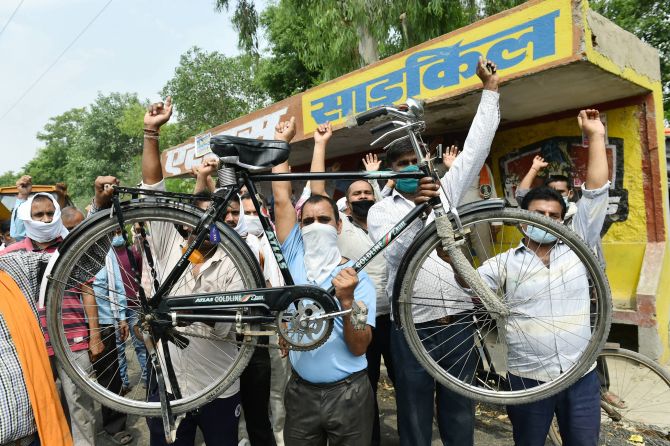Atlas Cycles shut down its manufacturing unit at Ghaziabad’s Sahibabad on Wednesday, ironically on the same day as the World Cycle Day. The company’s abrupt decision seems to have come at the heels of decreased economic activities under the lockdowns enforced in the wake of Coronavirus pandemic. The company shut down its shutters and temporarily laid off around 1000 employees.
At one cursory glance for a layman, it would look like the financial restrictions in wake of a pandemic might have spelled doom for ‘Atlas’ but the reality is far from it.
The imports of cycles from China that are routed through Bangladesh, Sri Lanka into India have been bleeding dry the Indian cycle industry. COVID-19 was just the last straw that broke the camel’s back. Chinese-made bicycles and bicycle parts are flooding in from neighboring countries in Indian markets, which is making the local producers fight till the last dime for the market share.
The total imports of bicycles, bicycle parts and components in India increased to $862 million in 2018 from $637 million in 2011.
The import duty on bicycles in India is zero under the Agreement on South Asia Free Trade Area (SAFTA), which provides duty-free access to Bangladesh and Sri Lanka bicycle manufacturers in the Indian market. China is not a party to the pact but is still reaping its benefits by outsourcing its products to Bangladesh and Sri Lanka which in turn flood the Indian market.
SAFTA was signed by India, Bangladesh, Sri Lanka, Afghanistan, Bhutan, Maldives, Nepal, and Pakistan on January 6, 2004, however, it came into force in 2006. SAFTA is aimed at fostering cross-border trade and economic cooperation. But Indian bicycle and parts manufacturers, seeing a rapid increase in imports from Bangladesh and Sri Lanka, are crying foul.
The import duty in Bangladesh and Sri Lanka is 25 percent and 30 percent respectively. High import duty helps Bangladesh and Sri Lanka to protect their bicycle industry. However, India has zero import duty which allows a lucrative and economically profitable environment for the Chinese.
China circumvents the preferential market under SAFTA by routing its bicycle and bicycle products from Bangladesh and Sri Lanka.
This is evident from the imports of Bangladesh and Sri Lanka from China. Imports of bicycle parts and components from Bangladesh were $24 million in 2011 and increased to $65 million in 2018. Similarly, imports of bicycle parts and components from Sri Lanka increased were $19.5 million in 2011 and reached $32.3 million in 2018, according to a report in Business Line.
In addition, Bangladesh and Sri Lanka bicycle manufacturers do not prefer the Indian market to import parts and components. They rely on China as the price is much lower which again hurts the Indian bicycle industry.
India is the second-largest producer of bicycles and manufactures around 1.5 crore bicycles every year with an annual turnover in excess of Rs 6,000 crores. Indian bicycle products are widely known for their quality and durability. However, the cheap bicycle imports from China have proved a major hurdle in the Indian cycle manufacturer’s fortunes.
The Indian bicycle industry plays an important role in the growth, development, and expansion of the Micro, Small Medium, and Enterprise (MSME) sector. The Industry analysts have been suggesting the government to take necessary steps to protect the future of the country’s bicycle sector.
In the post-COVID world when the country’s economy will be needed to jumpstart, the MSME sector will play a pivotal role, and protecting the bicycle industry will mean protecting the entire industry.
Therefore, the Indian government can start by modifying the existing rules of origin of SAFTA and it could impose sourcing restrictions on SAFTA’s signatory countries like Bangladesh and Sri Lanka so that they do not import any product from China to push into the Indian market during any stage of production. Instead, the government should limit imports from FTA countries only.
